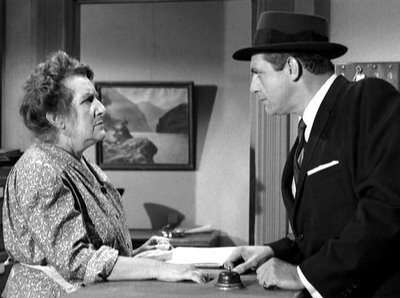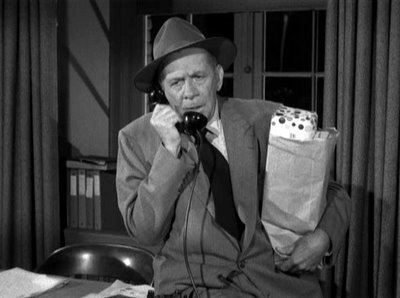PERRY MASON
SEASON 1, VOLUME 1
1957, CBS DVD/Paramount, $49.99, 960 minutes, DVD-1
"Raymond Burr is PERRY MASON," says the front of this five-disc box set, and after watching the first 19 episodes of the long-running CBS teleseries, it's unlikely anyone will argue the point. Other actors have tried -- Warren William, Ricardo Cortez, even Monte Markham -- but Burr owns Mason in a way few other actors have taken possession of a part. In today's information age, we can now see that any number of Mason's investigational tactics, and even some of his courtroom ploys, are beyond the pale of acceptable behavior for an attorney, but the massive Burr (who was a mere 39 years old when filming began) brings tremendous authority to his performances, as well as intellect and an occasional, impish twinkle.
PERRY MASON debuted on September 27, 1957 and ran until May 22, 1966, an unprecedented run for an hour-long evening drama; it has never been off the air since. Nevertheless, as time has gone on, roughly 6-10 minutes of each episode has tended to be cut in order to provide more commercial time slots for the stations hosting it. The broadcasts on SuperStation WTBS in the 1980s and '90s were notoriously incomplete, but even as long ago as the mid-1970s, I can remember watching PERRY MASON on a local station and seeing in the end credits frequent references to "Gertie" (Mason's receptionist, played by Connie Cezan) and also "Autopsy Surgeon" (a role usually essayed by Michael Fox) -- neither of whom ever appeared in a single show, as locally broadcast. That's thirty years ago; thus, one of the greatest pleasures of acquiring the series on DVD -- especially for those of us who have supported the show with our audience over the last nearly 50 years -- is the now-privileged opportunity to see and judge the episodes once again in their complete state.

Mason at the scene of a crime, handling evidence with a hankie.
For those who don't know the basic set-up, Perry Mason is a high-profile Los Angeles attorney specializing in murder cases, who is assisted in his work by private detective Paul Drake (TWENTY MILLION MILES TO EARTH's William Hopper) and secretary Della Street (Barbara Hale). Mason's uncanny winning streak and knack for making his legal opponents look unprepared at best, and downright stupid at worst, has won him the resentment of district attorney Hamilton Burger (William Talman), while his tendency to use his thorough knowledge of the law to bend it without breaking it keeps police Lieutenant Tragg (Ray Collins) ever lying in wait to pounce in the event of a slip-up.
PERRY MASON was filmed during the heyday of B-sci-fi and horror movies, and the supporting guest casts of these first 19 episodes include such familiar faces as Robert Cornthwaite, Whit Bissell, Brett Halsey, William Schallert, Greta Thyssen, Morris Ankrum (as a judge!), Joan Weldon, Barbara Eden, Olive Sturgess, and even Minerva Urecal. It's a treat to see them plying their trade in a different genre. One of the episodes, "The Case of the Fan Dancer's Horse," is notable for featuring one of the very few screen appearances of the wonderful Judy Tyler, who was killed in an automobile accident at the age of 23, only three days after completing her role opposite Elvis Presley in JAILHOUSE ROCK. The directors include Christian Nyby (THE THING), Ted Post (MAGNUM FORCE), and Laszlo Benedek (THE WILD ONE).

Mason meets Minerva Urecal in "The Case of the Fan Dancer's Horse."
The debut episode, "The Case of the Restless Redhead," has a grabby opening that Sam Fuller might have envied: a woman driving alone on a dark and winding road is suddenly pursued by another car, driven by a scary figure with a pillowcase hood over his head, who fires a gun at her. The episode, directed by William D. Russell, is more sensationalistic than the later ones, and Mason's character is still a pair of new shoes for Burr, who ventures the sort of sexist comments that were de riguer in pulp fiction but essentially beneath his vision of the character. One or two of the episodes included herein seem to dabble with portraying Mason as a sort of 20th century Sherlock Holmes, pronouncing deductions on the basis of minute detritus left at the scenes of crimes, but this too disappears. Another episode flirts conspicuously with the possibility of Mason being a frequent hat-wearer. What we see in the later episodes is the deliberate arrival at a standard of quality that would serve the show well, an essential ingredient of which was a certain mystery about Mason himself. For all the audience identification he engenders, we actually learn very little about Mason as a human being, and it comes as something of an unsettling surprise on those rare occasions when we see him relaxing at home or awakened in bed by a telephone call.
As entertaining and involving as these episodes are, I find that watching one episode somehow erases the memory of the previous ones, so that, over time, the shows one has already seen can become fresh discoveries again; that's not to say that the episodes themselves are forgettable, but that, regardless of how many times we see them, they remain pleasingly repeatable. Also, each individual episode offers a lot of details to focus on; as I went through this set, I found it a particular treat to admire Barbara Hale's consummate skill in participating in the background of scenes without distracting from the foreground or occupying her own space needlessly. In these episodes, we are also witness to a certain amount of non-romantic intimacy between Perry and Della that helps us to understand how the mystery of their relationship also helped to bait audiences. These episodes also show the program's creators and writers already responding positively to the danger of making defense attorneys look too attractive to the viewing public at the expense of district attorneys, with Burger and Tragg depicted in vignettes of later shows as sharing a meal with Team Mason or paying a friendly afterhours visit to his office, and everyone portrayed as equally interested in seeing justice prevail. The haste with which these episodes were filmed shows up only in one episode -- I think it's "The Case of the Moth-Eaten Mink" -- when an actor actually bumps into the camera while exiting frame; the fact that they kept the take rather than reshoot it shows that time was of the essence, probably far more often than is indicated onscreen.

Ray Collins as Lt. Arthur Tragg -- feisty flatfoot, Wonder Bread buyer.
The episodes are presented in their original broadcast order on five discs contained in three booklets in an attractive slipcase. They sport generally excellent audio/visual quality, looking much sharper than any episode you'll see on broadcast television, and retaining the original end credit windows for sponsor products like Sweet Heart soap and Dutch Cleanser. There is infrequent speckling, always preferable to excessive digital noise reduction, and more noticeable damage is briefly evident in "The Case of the Sulky Girl" in a moment where Perry and Paul, exiting a courtroom, light up some cigs. The episodes gain a good deal from being available in their complete form; some contain filler, but it usually functions in the service of character, adds a subtle element of humor, or helps to plant or support clues that are essential to the court cases. Unfortunately, the set is lacking in, shall we say, DVD "pyrotechnics" -- Barbara Hale is still around, as is director Ted Post, and it would be nice to have some series alumni contribute an audio commentary or two to forthcoming volumes. PERRY MASON - SEASON 1, VOLUME 2 (another no-friller) has been announced for a November release.
There have been a lot of courtroom dramas in the wake of PERRY MASON, but it's the one that continues to impress. To use a somewhat unclassy word, it's still classy after all these years.
